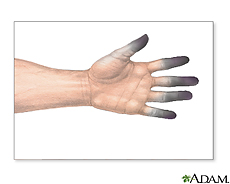 |
 |
 |
Other Health Topics:

-
Related Topics
-
Go Local
- Services and providers for Hypothermia in the U.S.
-
National Institutes of Health
- The primary NIH organization for research on Hypothermia is the National Institute on Aging
In cold weather, your body may lose heat faster than you can produce it. The result is hypothermia, or abnormally low body temperature. It can make you sleepy, confused and clumsy. Because it happens gradually and affects your thinking, you may not realize you need help. That makes it especially dangerous. A body temperature below 95° F is a medical emergency and can lead to death if not treated promptly.
Anyone who spends much time outdoors in cold weather can get hypothermia. You can also get it from being cold and wet, or under cold water for too long. Babies and old people are especially at risk. Babies can get it from sleeping in a cold room.
Other cold-related health problems are
- Frostbite - frozen body tissue, most often the face, ears, fingers or toes
- Frostnip - an early warning sign of frostbite that leaves affected areas white and numb
- Chilblains - red, swollen skin caused by inflamed small blood vessels
Centers for Disease Control and Prevention
-
Hypothermia: A Cold Weather Hazard
 (National Institute on Aging)
(National Institute on Aging)
Also available in Spanish
- Winter Weather: Hypothermia(Centers for Disease Control and Prevention)
| Basics | Learn More | Multimedia & Cool Tools |
|---|---|---|
| Research | Reference Shelf | For You |
-
Overviews
- Hypothermia(Mayo Foundation for Medical Education and Research)
- Winter Weather FAQ(Centers for Disease Control and Prevention)
-
Treatment
- Frostbite: First Aid(Mayo Foundation for Medical Education and Research)
- Hypothermia: First Aid(Mayo Foundation for Medical Education and Research)
-
Prevention/Screening
-
Extreme Cold: A Prevention Guide to Promote Your Personal Health and Safety(Centers for Disease Control and Prevention)
Also available in Spanish
- Tips to Protect Workers in Cold Environments(Occupational Safety and Health Administration)
-
Extreme Cold: A Prevention Guide to Promote Your Personal Health and Safety(Centers for Disease Control and Prevention)
-
Specific Conditions
- Chilblains(Mayo Foundation for Medical Education and Research)
- Fighting Off Frostbite(American Osteopathic Association)
-
Pictures & Photographs
- Cold Stress Equation(Occupational Safety and Health Administration)
-
Clinical Trials
-
ClinicalTrials.gov: Hypothermia
 (National Institutes of Health)
(National Institutes of Health)
-
ClinicalTrials.gov: Hypothermia
-
Journal Articles
References and abstracts from MEDLINE/PubMed (National Library of Medicine)
- Article: Hypothermia: a cool intervention for hypoxic-ischemic encephalopathy.
- Article: Profound hypothermia secondary to normal ziprasidone use.
- Article: Hypothermia in a desert climate: severity score and mortality prediction.
- Hypothermia -- see more articles
-
Organizations
- National Center for Environmental Health(Centers for Disease Control and Prevention)
-
National Institute for Occupational Safety and Health
Also available in Spanish
-
National Institute on Aging

Also available in Spanish
-
Occupational Safety and Health Administration
Also available in Spanish
-
Statistics
- Hypothermia-Related Deaths -- United States, 1999 -- 2002 and 2005(Centers for Disease Control and Prevention)
-
Children
- Cold, Ice, and Snow Safety(Nemours Foundation)
- Frostbite(Nemours Foundation)
- Winter Safety Tips(American Academy of Pediatrics)
-
Seniors
-
Stay Safe in Cold Weather!

 (National Institute on Aging) - Large PDF file
(National Institute on Aging) - Large PDF file
-
Stay Safe in Cold Weather!
| Home | Health Topics | Drugs & Supplements | Encyclopedia | Dictionary | News | Directories | Other Resources | |
| Copyright | Privacy | Accessibility | Quality Guidelines U.S. National Library of Medicine, 8600 Rockville Pike, Bethesda, MD 20894 National Institutes of Health | Department of Health & Human Services |
Date last updated: 11 September 2008 Topic last reviewed: 28 August 2008 |






